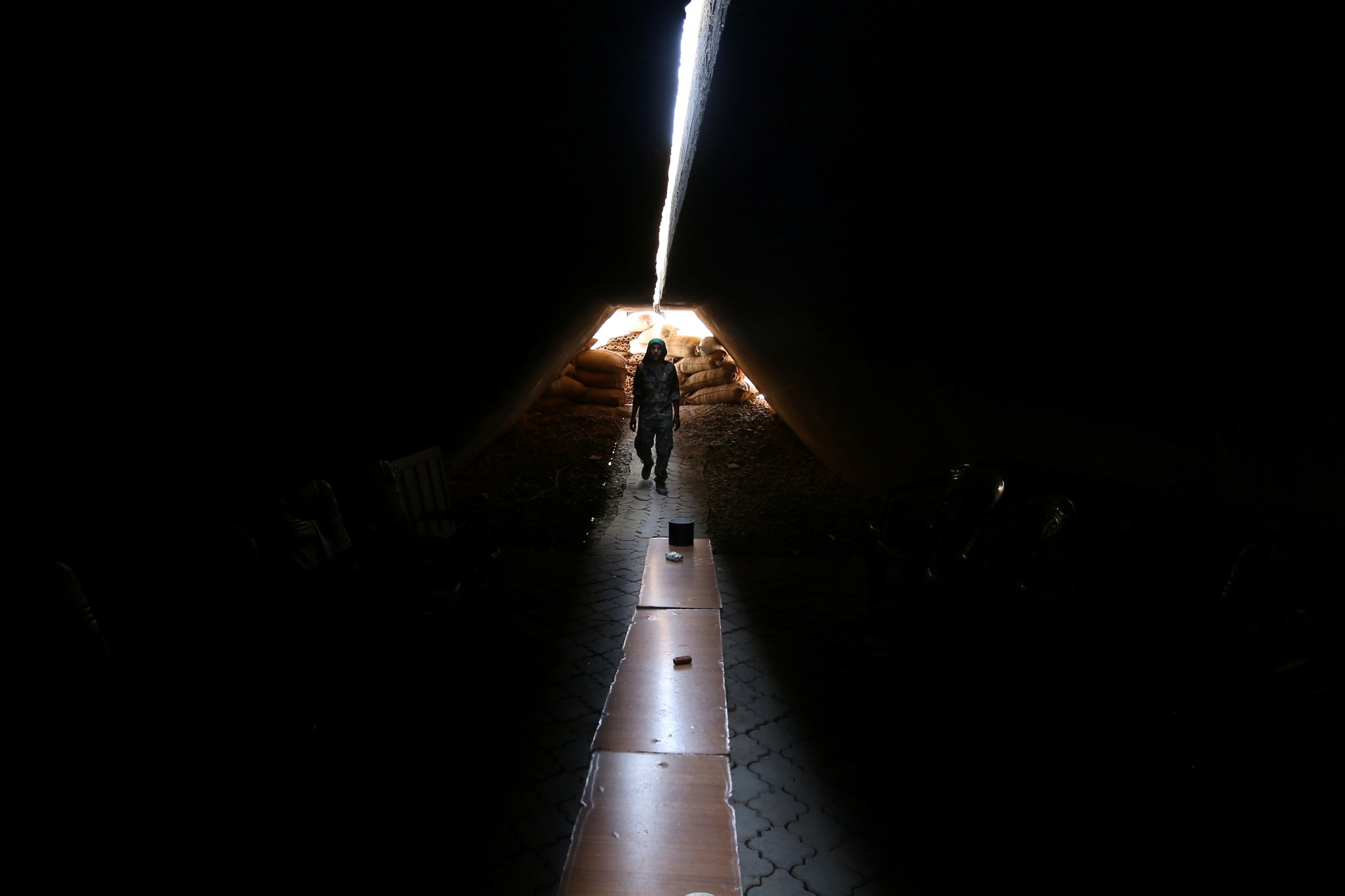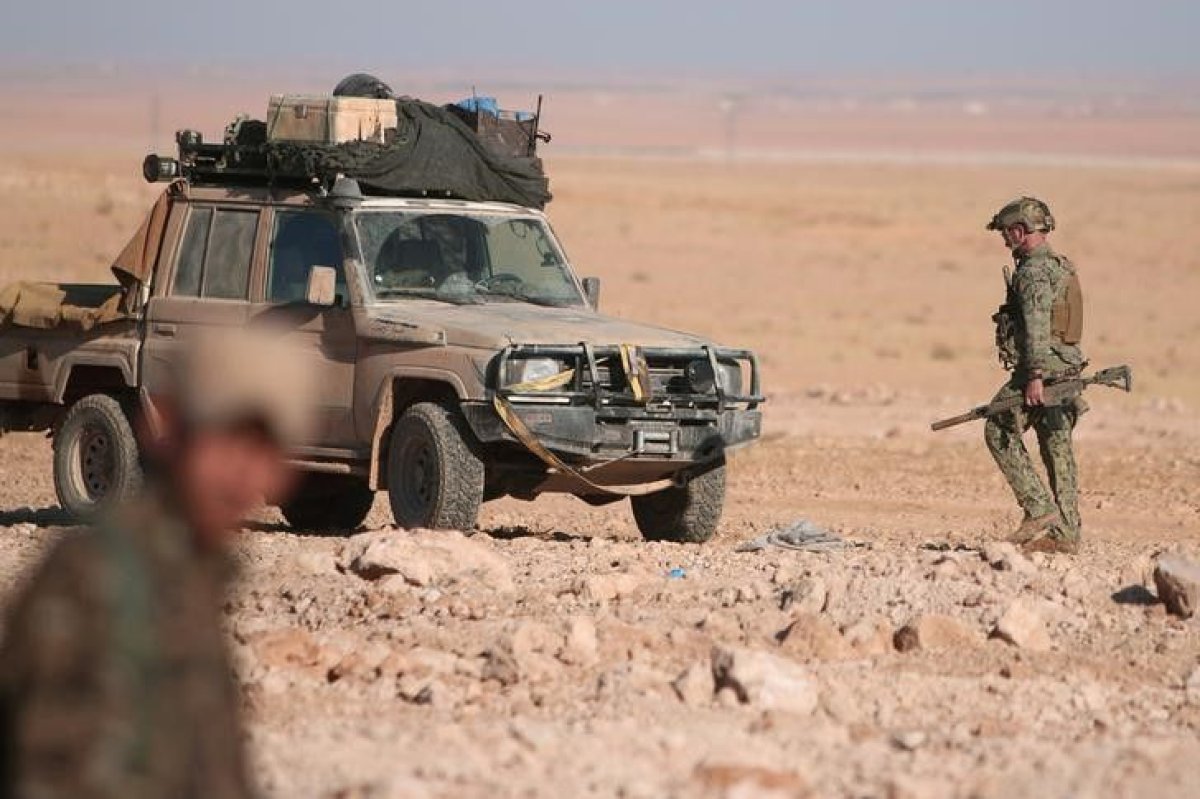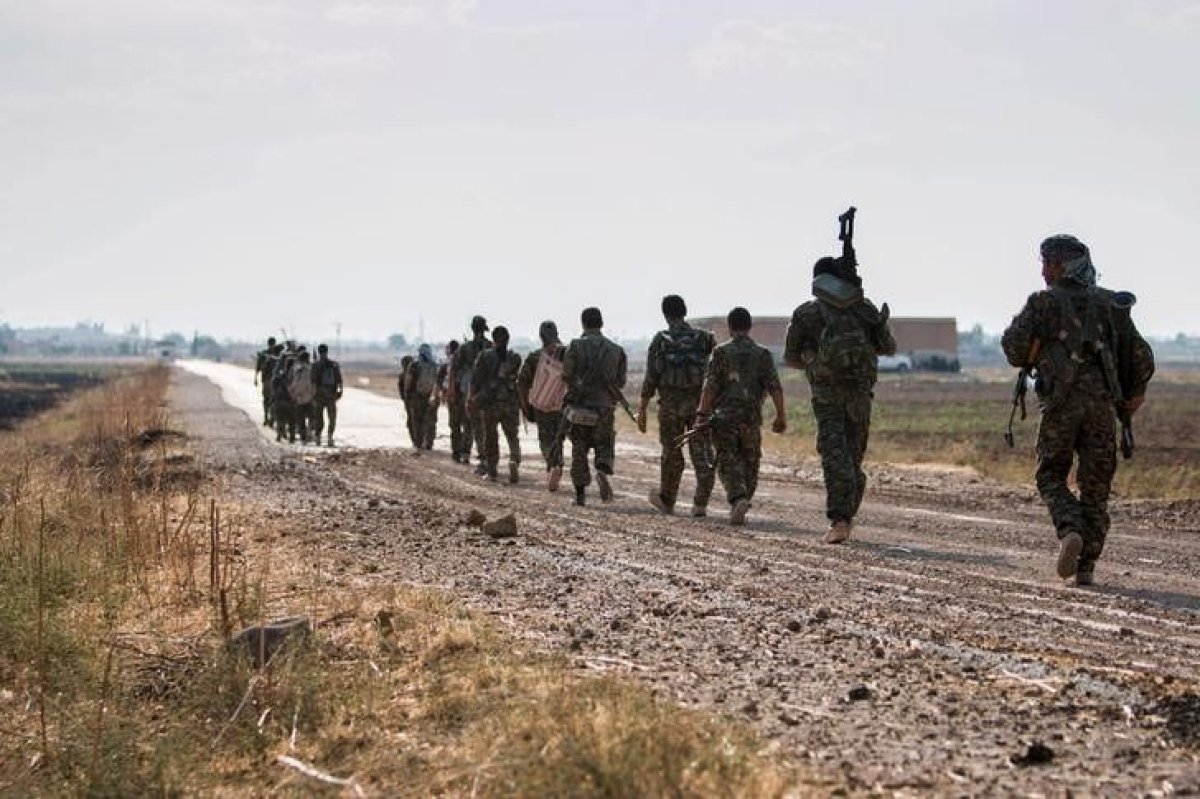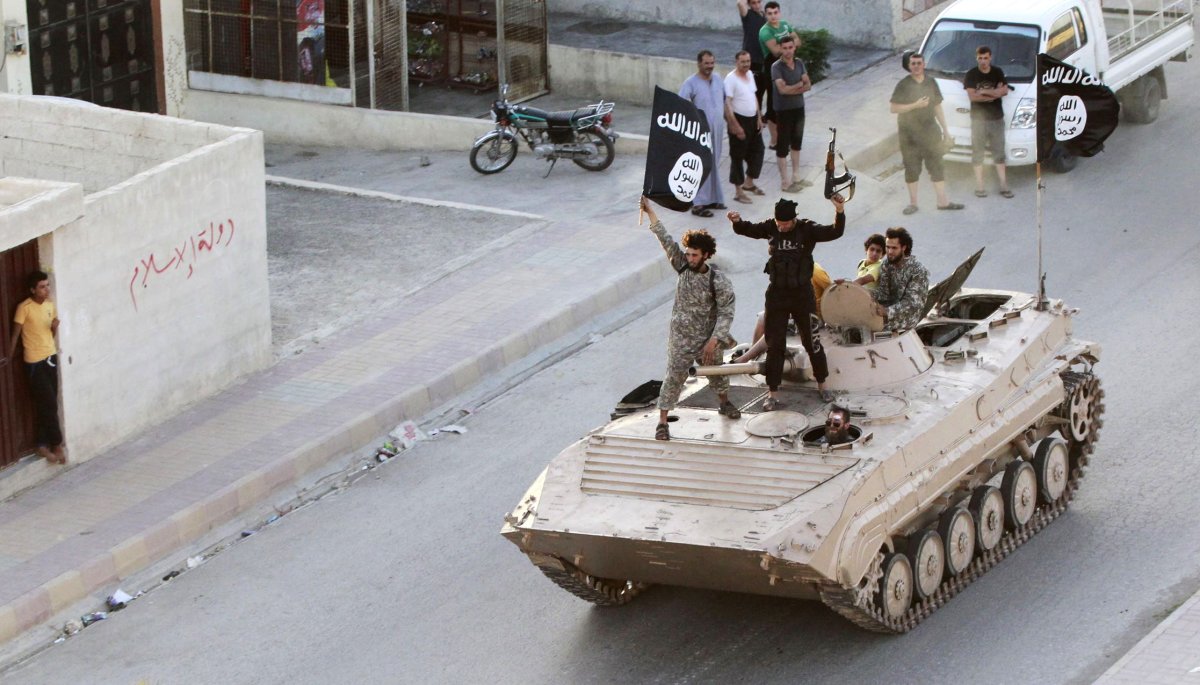
If the U.S.-Iraqi campaign for Mosul could cut the self-styled caliphate of the Islamic State militant group (ISIS) in half, the fall of Raqqa—the eastern Syrian city the group claims as its de facto capital—could be the final blow to the group's state-building project.
The looming U.S.-led coalition campaign, just like its operation in Mosul, will be complex and tough. It will involve multiple parties with conflicting stakes in the city's liberation—but it's a battle that could signal the end of ISIS's claim to statehood. Here's what we know about the coming battle for Raqqa.
The State of Play
Since January 2014, ISIS militants have controlled the eastern Syrian bastion in Deir Ezzor province. In the early stages it was a hub for operations planning, financing, and the detention of hostages. It became central to the group's state project, which leader Abu Bakr al-Baghdadi would formally announce in a speech at Mosul's Great Mosque in July later that year.
As the effects of the U.S.-led coalition's air campaign, which began in September 2014, wore on the group's operations, top leaders and foreign fighters headed for the surrounding countryside or to Iraq in the east. Now, between 3,000 and 3,500 ISIS fighters remain in the city, the coalition press desk said in a statement emailed to Newsweek, in comparison to 2014, when the CIA believed the group had as many as 31,500 fighters in Iraq and Syria. The airstrike campaign has rendered much of the city a ghost town, says activist group Raqqa is Being Slaughtered Silently.
The security vacuum brought about by Syria's bloody six-year civil war has allowed ISIS to retain control of Raqqa, but with the battle for Mosul in full motion, the U.S.-led coalition has now shifted one eye to the Syrian city that was the scene of the beheadings of American journalists James Foley and Steven Sotloff in 2014.
The coalition and its partners on the ground have effectively hemmed in the city on three sides. The SDF is fighting ISIS in the village of Karama, 10 miles east of Raqqa. The forces remain stationed at Al-Baleikh Bridge, northeast of Raqqa, says Rami Abdulrahman, head of the Syrian Observatory for Human Rights (SOHR), a monitoring group with a wide network of contacts on the ground in Syria. He says SDF fighters are 12 miles from the edge of Raqqa to the north, and 18 miles to the northwest.
On Wednesday, Syrian Kurdish and Arab forces, part of a militia coalition known as the Syrian Democratic Forces (SDF) spearheaded a daring raid behind enemy lines at the Tabqa Dam. According to the coalition, ISIS has used the dam area, perched on the banks of the Euphrates River, as a key attack planning base, 25 miles west of Raqqa.
The operation launched a new phase in the battle for the city, one that signaled to ISIS that the full-scale offensive against it no longer remained a distant proposition. Since then, the SDF have captured the strategic Tabqa airbase, in close proximity to the eponymous dam they are battling to secure.. France's Defense Minister Jean-Yves Le Drian said just as much on Friday, announcing to French television channel CNews that the battle would begin "in the coming days."
Raqqa's Significance
Victory in Raqqa would be a critical success for both the international coalition and local ground forces. The city's liberation would release ISIS' stranglehold on a strategic location where it has maintained the ability, and taken the time and space to plan international attacks such as the November 2015 suicide bomb and gun assault in Paris.
Ground forces are fighting in Raqqa "so that other coalition nations do not continue to suffer the threat of ISIS terrorism inside our own borders," Colonel Joe Scrocca said in a statement Wednesday. It would represent the biggest defeat for ISIS in Syria, effectively cutting its remaining territory, sandwiched between eastern Syria and northwestern Iraq, in two.
For local forces, a win would rid ISIS of its main base in northern Syria, where it has plotted operations against both Arab and Kurdish forces. It would allow many Arabs who fled the group's brutality to return to their homes. Crucially, it would free the civilians trapped in Raqqa living under ISIS' rule, and any hostages that remain in captivity there.
The Key Players
Islamic State
Number: 3,500 (coalition estimate)
The coalition said it estimates that there is "anywhere between 3,000-3,500 ISIS fighters" remaining in Raqqa. But while it knows foreign fighters remain inside the city, "there is currently no estimate" of how many would be battle-hardened foreign fighters ready to return home.
As thousands of forces prepare to face the extremist group, it is projecting an image of calm to both civilians inside Raqqa and its supporters around the world, according to monitors.
"There is normal life in Raqqa city," Abdulrahman of Syrian Observatory for Human Rights told Newsweek.
"People are scared," he says, citing activists in the wider Raqqa region, "but [ISIS] wants to show the people there is normal life, that nothing has happened." Online experts say the group's fighters are not commenting on the looming battle on its forums or encrypted chat channels.
But ISIS is preventing civilians from leaving the city, and allowing its foreign fighters to flee. As in Mosul, the group's fighters have likely fortified the city in preparation for the battle ahead. Booby traps, suicide car bombs and snipers may well slow the offensive once it begins.

The U.S.-led coalition
Number: 500 approximately (special forces and advisory personnel)
The U.S. military has deployed several hundred Special Forces to prepare for the battle to oust the group from its capital, as well as provide air support. It has used allied ground forces to spot for airstrikes, established an expeditionary force of elite Marines who are tasked with seeking top ISIS leaders in Syria and Iraq, as well as training Kurdish and Arab forces on the ground.
The military appears to have retained these three prongs as key tenets of its strategy in the upcoming battle for Raqqa. The coalition told Newsweek in an email it would continue to "train and equip" local partners and boost the SDF by "advising and assisting their leadership, by providing intelligence, and surveillance support, and through precision air and ground fires against military targets."
Another key role of the U.S. will be using its clout to avoid diplomatic fallout with the various players involved, as outlined below, while achieving its ultimate aim: destroying ISIS' caliphate.
YPG
Number: 27,000
The Kurdish militia is the largest party in the SDF and represents what the U.S. views as the most effective ground force fighting ISIS in Syria. Advances by the Kurds—a stateless people who seek an autonomous region known as Rojava in northern Syria—have angered the Turkish leadership. Turkey views the militia to be an offshoot of the PKK, the outlawed Turkish militant group waging an insurgency against Turkish authorities.
Washington supports the YPG's involvement, while Turkey opposes its presence further along its southern border, viewing the moves as a territorial grab. Their role as the battle moves deeper into Raqqa remains unclear.
Arab fighters
Number: 23,000
The U.S. coalition is using thousands of local Arabs fighters, trained to combat ISIS alongside their Kurdish partners. They will be key in the battle against ISIS as Raqqa is a predominantly Sunni Arab city. The entry of Kurdish fighters poses a major security risk to ground operations, such as dealing with a population potentially hostile to forces from a Shiite or Kurdish background.
The key problem with the ground operation, says Lina Khatib, head of the Middle East and North Africa Programme at London-based think tank Chatham House, is precisely this: As Kurds move closer to the center of Raqqa "there is a risk of ethnic tension erupting."
It is for this reason that the Kurdish Peshmerga have held back from the center of Mosul, leaving much of the street-to-street battles to Shiite and Sunni Iraqi forces. It will likely be a similar scenario in Raqqa, with Arab fighters tasked with the most fierce close-combat roles deep inside the ISIS-held city.
Turkish military
Number: 4,000
Turkey-backed moderate Syrian rebels: 2,000
Turkish forces entered Syrian territory in August alongside the moderate Syrian rebels it is backing and Turkey now wants to play a role in the battle for Raqqa. Ankara is lobbying Washington, under the new administration of Donald Trump, to withdraw its support for the Syrian Kurdish forces, who Turkish forces have attacked in northern Syria. Turkish ground and air power helped to liberate the ISIS-held northern Syrian towns of Jarabulus in August and Al-Bab last month.
Ankara has pointed to these victories as a sign of its effectiveness against ISIS. But it is only willing to assist in the liberation of Raqqa with Syrian rebels, not the Kurds—a sworn enemy. America has a choice to make, and it appears that it has picked its partner: the Kurds. This could change, however, depending on how much pressure Turkey, a key NATO ally, exerts on the Trump administration. For example, Turkey allows U.S. aircraft to operate from its Incirlik air base in southern Turkey, and it could call into question its hosting of the coalition there.
Syrian regime
Number: Unknown
The regime of Bashar al-Assad, which claimed victory in Aleppo in December with the backing of allies Russia and Iran, is battling ISIS in its last enclave, Deir Hafer, in the northern Syrian province of the same name.
While the focus of Damascus lies here for now, Syria's chief negotiator Bashar al-Jaafari, speaking to reporters at peace talks in Geneva on Friday, warned that a U.S. or Turkish military effort for Raqqa without coordinating with the regime would be "illegitimate." It believes that the only force that should be battling ISIS is the Syrian army, with Moscow and Tehran's support.

Key Targets to Watch
Because of security concerns, the coalition would not reveal the key targets it hopes to conquer as it tries to liberate Raqqa, apart from the Tabqa Dam, where an operation is currently ongoing. "We can tell you that we will strike ISIS wherever we find them," it told Newsweek . Here are some of the likely strategic points that the coalition will be looking to recapture:
- Tabqa Dam, western Raqqa
- Al Baleikh Bridge, eastern Raqqa
- ISIS command center, central Raqqa
- Hostage prison, central Raqqa
- Great Mosque of Raqqa, central Raqqa
- Euphrates river crossings, southern Raqqa
The Trump Factor
Trump has suggested that he will work with Russia and Assad to "obliterate" ISIS in Syria, but the military has so far appeared to continue using the "By, With and Through" approach. That means training and relying on local partners to lead the campaign as the Obama administration had done with the Syrian Kurds for more than a year, and the U.S. military has done for decades in different countries. Despite accusing his predecessor of being the "founder of ISIS," his strategy for defeating the group is strikingly similar to that of the Obama administration.
"The current U.S.-led international coalition's strategy against ISIS in Syria seems to be a continuation of that under Obama," says Chatham House's Lina Khatib. "The strategy remains mostly built on coalition airstrikes coupled with the use of local fighters on the ground."
Sean Spicer, Trump's press secretary, on March 22 said that the U.S. military would "use all of the tools of national power, in coordination without international partners," focusing on cutting ISIS's funding, sharing intelligence and denying ISIS safe havens. Little seems different from Obama's approach. But Trump can be unpredictable, and his ISIS strategy, which he commissioned Defense Secretary Jim Mattis to present in February, could change at a moment's notice.
One notable change is that Trump is moving to loosen restrictions on airstrikes, bestowing the military with greater authority in its target selection. But as the New York Times notes, this could come at a high cost in Raqqa, as the deadly strike on a Syrian school sheltering families near the ISIS-held city on March 21, killing 35 people, demonstrated.

How long will it take?
The coalition declined to provide an estimate regarding when it expects to liberate Raqqa. "There is no timetable to begin the liberation of Raqqa. The SDF is currently working to completely isolate Raqqa," it said in an email to Newsweek .
But U.S. Army Lieutenant General Stephen Townsend, the U.S.'s top commander leading the fight against ISIS in Iraq, estimated in February that Washington and allied forces will recapture both Raqqa and Mosul within six months. This is the official estimate but, depending on the will of ISIS's battle-hardened jihadists, the operation for Raqqa could become protracted, lasting towards the end of 2017.
"ISIS is likely to put up a tougher fight to defend Raqqa than it did in other Syrian areas, just like it did with the battle of Mosul that has been tougher than other battles in Iraq," says Khatib.
Iraqi and Kurdish forces set in motion the battle for Mosul in October 2016, and the fight is still raging more than five months later. But Raqqa is a much smaller proposition than Mosul. Raqqa, once Syria's sixth-largest city held a population of just 200,000 before ISIS's takeover, in comparison to Mosul's million-plus civilians.
What Comes Next?
There appears to be little planned in terms of who will control Raqqa after it falls.
Will it be the Kurds? Almost certainly not, because of Turkish demands and U.S. pressure on Kurdish forces to withdraw back to the areas it previously controlled, east of the Euphrates. And what about the U.S., which currently seems to lack the political will for a large troop presence in Syria.
Or, will it be Turkey? The Kurds and the Assad regime oppose a greater Turkish presence on Syrian soil. It will most likely be either the Arab forces fighting to liberate a city that is already predominantly Arab, or the Syrian regime, as the city sits within Syrian sovereign territory.
But for now, the main goal is to bring down the black flag that has flown over the city for more than two years—and that's not likely to be an easy feat.
Uncommon Knowledge
Newsweek is committed to challenging conventional wisdom and finding connections in the search for common ground.
Newsweek is committed to challenging conventional wisdom and finding connections in the search for common ground.
About the writer
Jack is International Security and Terrorism Correspondent for Newsweek.
Email: j.moore@newsweek.com
Encrypted email: jfxm@protonmail.com
Available on Whatsapp, Signal, Wickr, Telegram, Viber.
Twitter: @JFXM
Instagram: Read more
To read how Newsweek uses AI as a newsroom tool, Click here.








